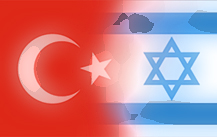 On Friday, Turkish Foreign Minister Ahmet Davutoglu underlined the the "new era" that had begun in the country's diplomatic relations with West Jerusalem, after Ankara sent fire-fighting aircrafts to help in northern Israel and held talks with Israeli officials in Geneva
On Friday, Turkish Foreign Minister Ahmet Davutoglu underlined the the "new era" that had begun in the country's diplomatic relations with West Jerusalem, after Ankara sent fire-fighting aircrafts to help in northern Israel and held talks with Israeli officials in Geneva
After less than two weeks Deputy Minister Huseyin Celik called Israel the "engineer" of the release of WikiLeaks documents, another Deputy Prime Minister, Cemil Cicek, declared:
We support the talks that started in Geneva. We hope that Israel continues to display a constructive approach. Turkey’s conditions are out there but it seems difficult for Israel to accept those conditions considering its domestic politics.
According to sources, the Israeli side has agreed to give compensation to the families of the nine Turkish victims of May's attack on the Gaza-bound Freedom Flotilla. However, West Jerusalm still does not intend to issue an official "apology". Israel prefers a statement of its "regret" based on "humanitarian" reasons. An Israeli official told Haaretz that the talks are "stuck" and that "differences are still great".
So, is Ankara demanding the "impossible" from West Jerusalem, even as it pursues regional autonomy and credibility as a "peace-seeking", "constructive", and "objective" actor? Or is this a tactic where the Erdogan Government can still profit from the uncertain relations, not demonising Israel but still criticising West Jerusalem as it offers a hand.
This is the pursuit of Turkey's "strategic depth", developed by Foreign Minister Davutoglu, through "strategic parts", in this case, a method to solve problems --- eventually --- while maintaining stature after the red alert in relations with West Jerusalem.
But tension cannot be sustained forever. So who gives first? Israel's Netanyahu government or the Erdogan camp in Turkey?